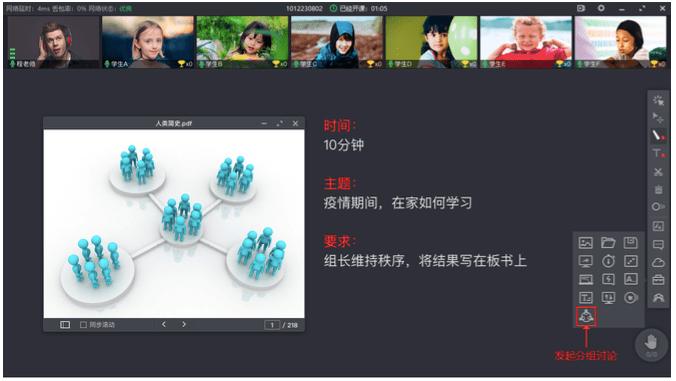The following article comes from Huipu by Liu Kai.
Return to the park.
Tracing back to the source, being clumsy, asking for knowledge and seeking novelty
At the beginning of the new semester, normal teaching order has been restored in most parts of the country, but there are still some areas that can only postpone the start of school or continue to implement online classes because of the epidemic, and some areas have to return to online teaching because of the epidemic after normal resumption of school. Although the society generally regards online classes as an expedient measure in a special period, online teaching has become an inevitable trend in the network age. What should teachers, students and parents do to have a good online class? Based on the research results of "learning" in multi-disciplinary fields, this paper gives some suggestions from several general directions.
Author | Liu Kai (bohai university College of Education Science)
Under the social background of pattern involution, "living a good life" and "studying hard" are more closely tied together. However, the ideal is full, the reality is skinny, and the huge social pressure makes the anxiety of students, parents and teachers accumulate, which is difficult to eliminate. Unfortunately, online teaching during the epidemic intensified this conflict.
Scholars have long warned that many learning methods circulating in the market are often wrong. In fact, the empirical research on learning and memory shows that many learning methods that are regarded as the standard by the public are actually useless. For example, the "10,000-hour law", which is popular all over the world, claims that a novice can become an expert by repeated practice for a long time, but it is not applicable to those subjects that need to be considered. Even some studies have found that reading textbooks repeatedly is usually a waste of effort. There are also many students and parents who are bewitched by extracurricular tutoring institutions or best-selling books, thinking that learning may become a happy thing, so they buy "easy-to-score blind boxes" everywhere, resulting in a waste of money and time and poor results. As everyone knows, all learning that can be transformed into games is shallow learning. Although educational games are good, they have attracted countless heroes to "bend their backs"-so far, deep learning cannot be realized from them.
Intuition or individual experience that has not been scientifically verified is often unreliable, so we need "Learning Sciences", a new interdisciplinary subject that uses scientific methods to explore learning laws. As the saying goes, "teaching and learning learn from each other", the science of learning is not only the "amulet" of effective learning, but also the "compass" of effective teaching.
Large-scale online teaching has established a synchronous live classroom in different places, which has guaranteed the normal teaching progress in a special period. But at the same time, it also brings three main problems:
(1) sacrificing teachers’ on-the-spot control of teaching;
② Increased the marginal cost of real-time communication;
③ It reduces the speed and quality of learning feedback.
In this regard, the existing research results of "Science of Learning" provide some suggestions for teachers, students and parents in online classes.
one
How can teachers "teach" better?
(1) Carefully prepare teaching materials.
Basic principles:
Memory content should be "static" (graphic), and understanding content should be "dynamic" (video);
The content is decomposed into a plurality of interrelated small modules; The presentation of teaching materials is very important.
Video material:
Advocate the use of video materials with subtitles or shot from the first angle;
If clues can be added to the video, it will be of great benefit to students in the middle and late grades;
It is better to split the video according to logic, but the double-speed playback effect is poor.
Graphic materials:
PPT is concise and not fancy, and the whole text is not acceptable;
The presentation of new knowledge points, with no more than 4 pages, should be horizontally arranged with pictures and texts;
Use graphics to express the logical relationship of content;
To create a school atmosphere, courseware should use the school background or Logo uniformly.
(2) Adopt appropriate teaching methods.
Basic principles:
Applying the teaching strategy of "technology promoting learning" can never copy the traditional classroom teaching mode;
Avoid asynchronous online teaching and strive for synchronous teaching.
Effective methods:
PBL, role-playing method, inquiry teaching method and case teaching method are effective, so the classroom should be used with caution or not. Gamification teaching is effective for small class or simple content courses;
The mouse icon on the teacher’s side can be changed to a finger shape with eye-catching color (such as black or red).

Reward and punishment means:
Fully create and make good use of virtual rewards, and at the same time often grasp and strictly control cheating.
(3) Increase effective teaching interaction.
Basic principles:
Engage in meaningful interaction, not for the sake of interaction;
Frequency of interaction is not important, but depth of interaction is important;
Adopt a variety of interactive ways.
For students:
It is advisable to refer to students with "you" instead of "you";
Restrain and reduce meaningless expressions, such as "hmm";
Use more friendly oral expressions to be "vulgar" rather than "rough", such as "old irons, learn";
Combining exaggerated expressions or increasing repetitive guiding gestures when teaching key content can improve students’ attention and deepen their understanding;
For the teaching content that needs in-depth understanding, we should create situations to guide in-depth discussion and ask students to pay attention to and share other people’s views.
For teachers and students:
Encourage group cooperation, increase teacher-student interaction and student-student interaction;
Online classes also need a break, which takes 5 minutes;
In the second half of the course, we should consciously stimulate students’ positive emotions;
Encourage more students with average and poor grades;
Pay attention to students’ mistakes, provide convenient communication channels and give timely feedback.

Group discussion function provided by an online teaching platform Source: Network
(4) present a suitable teacher image
Basic principles: Teachers appearing in real person can slightly improve students’ grades and greatly improve online learning experience and satisfaction.
Being able to appear in the camera: show your upper body (head+hands) and stand on the side in front of PPT, keep your eyes on the camera as much as possible, and use expressions and gestures as guiding clues. Otherwise, there is no need to leave the country.
Can’t leave the country: even if you can’t leave the country in person, it’s better to use my photo as your avatar than to leave it blank or scenery.
two
How can students "learn" better?
(1) Learning equipment
Try to use computers instead of mobile phones for online classes; The bigger the screen, the better. Try to use a computer instead of a mobile phone to study. Electronic paper books are a good thing, and electronic reading should be strongly advocated.
(2) study habits
Pay attention to self-study activities before class and prepare well;
Whether it is correct or not, please actively answer the teacher’s questions in class;
The learning effect of accelerating video playback is very poor. If you have to fast forward, you should not exceed 1.5 times the speed.
We must learn self-management and strictly resist non-learning behavior during class.
(3) cooperation between students and students
In the context of online classes, positive individual cooperation will quickly warm the whole group, regardless of boys and girls;
Peer rejection is more likely to lead to online bullying and anger. Please be more tolerant and considerate to people around you.
Everyone is for me, and I am for everyone. Helping and sharing students is beneficial to the overall improvement of learning effect.
(4) Emotional regulation
Maintaining moderate learning pressure can effectively avoid learning burnout;
Positive emotional state can make online learning have higher maintenance, migration, effort and learning satisfaction;
Willpower can effectively beat boredom and improve the learning effect. Students in online classes must consciously cheer for self-control.
three
How can parents "accompany" better?
Online class companionship is a magic weapon to relieve parents’ anxiety, and it is also a direct inducement to trigger children’s emotional fluctuations;
Improving the quality, not the quantity, of parents’ study companionship and actively improving the way of parent-child academic communication are the right way for online class companionship;
Before urging their children to complete their schoolwork tasks, parents should first set aside a 1-minute "buffer period" to recall whether they would have done better than their children now, and then try to talk to their children with a peaceful mind.

four
How can the Education Commission "manage" it better?
Online teaching has obvious differences between urban and rural areas, and education management departments should pay more attention and resources to township schools;
It is not easy to prepare lessons for online teaching, so it is necessary to reduce the burden on teachers and reduce the apportionment of things unrelated to teaching.
Conclusion
The scientificity and effectiveness of pedagogy have been controversial, and the development of learning science in recent 50 years has pointed out the direction for the scientific way of education. Unfortunately, many front-line workers are deeply immersed in the "artistry" of education, ignoring or resisting the "scientificity" of education, which leads to the waste of teaching time and the inefficiency of teaching effect. Education itself does not exclude art, but it cannot rely solely on art. The above suggestions not only have strong "scientific" operability, but also can be flexibly combined to reflect "artistic" creativity.
All the suggestions in this paper come from the research conclusions of hundreds of papers (including meta-analysis) in 16 periodicals of psychology and educational technology CSSCI in recent ten years, and I would like to thank these scholars for their hard work and dedication.
推荐阅读
[1] 彼得·布朗著,邓峰译. 认知天性:让学习轻而易举的心理学规律. 中信出版社,2018.
[2] R. 基思·索耶 主编. 徐晓东等译. 剑桥学习科学手册(第2版). 教育科学出版社,2021.
[3] 郑旭东 等著. 学习科学:百年回顾与前瞻. 科学出版社,2020.
[4] 约翰·D·布兰斯福特 等 著. 程可拉 等译. 人是如何学习的(Ⅰ). 华东师范大学出版社,2013.
[5] 科拉·巴格利·马雷特 等 著,裴新宁 等译. 人是如何学习的(Ⅱ). 华东师范大学出版社,2021.
[6] 理查德·E 梅耶 著. 盛群力 等译. 应用学习科学. 中国轻工业出版社,2019.
[7] 简妮·爱丽丝·奥姆罗德,布雷特·琼斯 著. 雷雳 等译. 教育心理学(第5版). 中国人民大学出版社,2021.
[8] 桑新民. 学习科学与技术——信息时代学习能力的培养(第2版). 高等教育出版社,2017.
END

更多精彩文章请点击下面“蓝字”标题查看:
Comments on the expansion of Maxwell’s equations Professor Wang Qing: Deeply understand the "expanded Maxwell’s equations" —— Version 2.0 Professor Wang Qing: Understand Academician Wang Zhonglin’s "expanded Maxwell’s equations" and "touching porcelain" Maxwell: Galileo covariant and Lorentz covariant electromagnetic fields. Interesting topics: Lorentz covariant electromagnetic theory of moving medium. Excellent papers and peer reviewers in Physics and Engineering in 2021. List of Outstanding Young Scholars Professor Wang Qing: Problem-driven Education Originated from Socrates —— Learning and Growing in Interaction: Reality and Distance in Education Professor Wang Qing: Last night (June 9th), Academician Zhu Bangfen, Final Exam of Electrodynamics in Tsinghua: Misunderstanding of "Burden Reduction" and Challenges Faced by China’s Science Education "Physics and Engineering", No.5, 2021. Le Yongkang: American Physics Experiment Teaching and Comparison between China and the United States under the Prevention and Control of COVID-19 Epidemic. Gu Mu: Understanding and Experience of the Newly Formulated Basic Requirements for Physics Course Teaching in Non-physics Science and Technology Universities. Academician Zhu Bangfen: From Basic Science Class to Tsinghua School Physics Class. Academician Zhu Bangfen: Creating Top-notch Training. Reflections on new talents Professor Li Xueqian: Physics is a kind of culture Professor Li Xueqian: How to help physics students get through the hurdle from senior three to freshman: The core of ideological and political education in physics courses is to cultivate scientific cognitive ability. Mu Liangzhu: What is physics and physical culture? Mu Liangzhu: What is the cognitive model of ETA physics? Mu Liangzhu: What is the ETA physics teaching method? Professor Wu Guozhen: Impression of my graduate experience abroad —— Tsinghua University Physics Department."The 20th Anniversary of the Basic Science Class and the 10th Anniversary of the School Class"
Chen Jiaer, Zhao Kaihua and Wang Zhidong: Facing the 21st century, Professor Wang Yayu, who urgently needs to rebuild China’s engineering physics education: The concept and practice of undergraduate talent training in Tsinghua Department of Physics Professor Ge Weikun: Some thoughts on talent training at home and abroad Professor Annie Ann: Why does the traditional classroom teaching mode need to be changed? Professor Annie Ann: In fact, teaching is the process of accumulation. Professor Liu Yuxin: Some thoughts on undergraduate physics basic course teaching and textbook compilation Shen Ganruo: American and Canadian curriculum reform that has hit science education hard Henderson C: USA. Physics education research supported by research fund and its influence on higher physics education "Physics and Engineering" is an academic journal focusing on physics education and teaching research, and it is the core journal of science and technology in China. It was founded in 1981, and you are welcome to contribute enthusiastically.
http://gkwl.cbpt.cnki.net
Welcome attention
Physics and Engineering WeChat WeChat official account
Original title: "How to teach online classes well? 》
Read the original text